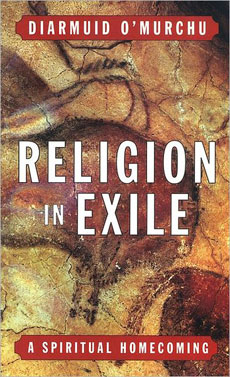"The journey home from exile is, more than anything else, an attempt at getting our priorities right. We are first and foremost a spiritual species — because we belong to a spiritualized universe. The fact that some have become religious is, in fact, quite secondary, although for them it may feel quite important. The retrieval of the spiritual raison d'etre of personal and planetary existence is the single greatest challenge of this unique historical moment in our evolution as a human species.
"To sustain us on our journey home from exile, we need to reclaim our spiritualized story. It enlivens our hope, but also helps to put in context the questions and yearnings that arise in our conversations. Fragmented and dismembered though our history may be, we can re-member — sometimes from recorded historical experiences, but also from the depth of the psyche, individually and collectively.
"In the early part of the twentieth century, the Jesuit palaeontologist, Teilhard de Chardin, met with ridicule from the scientific community and a virtual black-out from the religious world for suggesting a spiritual significance to the course of evolution itself. For Teilhard, a divine intelligence permeates the entire unfolding of cosmogenesis, culminating in the fulfillment pre-empted by the Christ of Christianity. Despite the opposition and misunderstanding, and the wish to desist from the explicit Christian focus adopted by Teilhard, his ideas have engendered a substantial following among scientists, cosmologists and theologians. The last decades of the twentieth century have witnessed a rebirth of cosmology with a renewed conviction that the course of evolution is a value-laden process, fuelled by a will-to-meaning imprinted in the very fabric of life itself (cf. Laszlo, 1996, 1998).
"Thus we witness some radical changes in perception and understanding. It is no longer esoteric to talk about an intelligent universe, an alive Earth, matter impregnated with consciousness. While many mainstream scientists quibble with these ideas, and some consider them extremely bizarre, growing numbers of people detect a deeper sense of truth and meaning for which these are key articulations.
"Concepts such as field influence, the creative vacuum and the self-organizing potential of life processes, all augment the notion of a highly creative and meaningful universe. And perhaps, most important of all, the discovery that interdependence and interrelatedness underpins the casual connections of the biochemical and physical world is what pushes the human imagination to raise questions of a distinctly spiritual nature.
"That evolution itself embodies a spiritual driving force, with a highly creative will-to-meaning, is what has instigated us — in the pages of this book — to consider the flourishing of spirituality over billions of years before humans ever evolved. In the words of one contemporary writer:
"The earth is much more sacred than we have supposed, much holier than we have treated it . . . It is not only the human being that has Spirit. There has been Spirit hovering over all the world since the beginning of creation. (Donovan, 1989, pp. 121, 123).
"Spirituality is not something that pertains to humans alone; it long pre-dates the existence of humanity. In fact, all indications are that we are endowed with a spiritual capacity precisely because the greater life-force that begot us is itself fundamentally spiritual. Born into a spiritualized world, we could not be other than spiritualized creatures."
